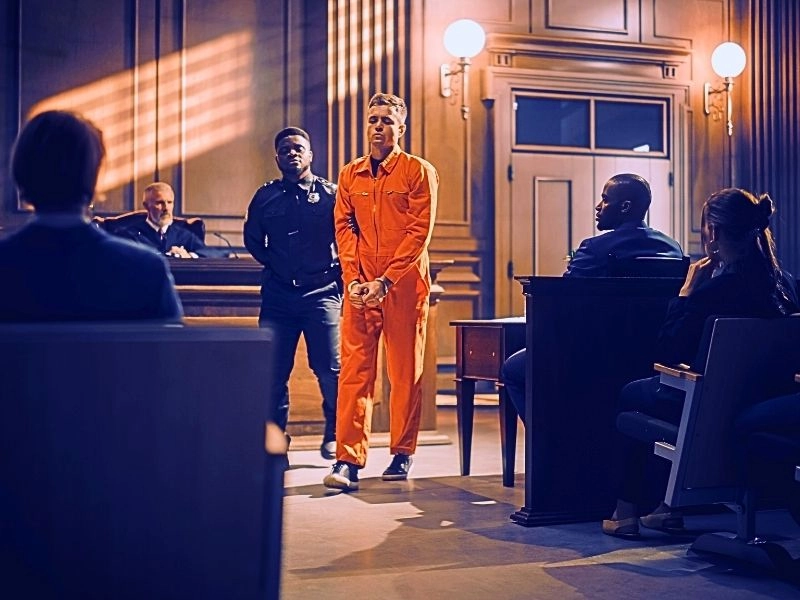
Criminal charges may arise if you are caught in public possessing an unregistered firearm. Simply possessing or owning an unregistered gun is not a crime in Minnesota. However, carrying a gun in public without a valid, up-to-date permit is illegal in Minnesota. Exceptions might apply in some cases. A criminal defense attorney can explain what happens if you get caught with an unregistered gun so that you know what to expect at every stage. The attorney will also help you fight your criminal charges aggressively to avoid the long-term consequences of a conviction.
Table of Contents
What Happens If You Get Caught with an Unregistered Gun?
You will be arrested and taken to the local police station after getting caught with an unregistered firearm in public. The arresting officer will take your photograph and fingerprint and process your arrest. The officer will then put you in custody pending arraignment.
The prosecution will review your case and file charges against you within 24 hours, if necessary. Law enforcement will then present you in court for arraignment. The judge will formally notify you of the charges you are facing. You will enter a plea, and the judge will then decide whether to release you on bail.
The punishment for possessing an unregistered firearm in public is up to a five-year prison time or up to a $10,000 fine. The penalties increase to up to a 15-year imprisonment and up to a $30,000 fine for an individual with a prior violent crime conviction.
A skilled criminal defense attorney can help protect your rights throughout all stages of the criminal process when facing weapons charges. The sooner you get an attorney involved, the higher your chances of obtaining a favorable outcome. Remember, you have a right to talk to an attorney after getting arrested. You can ask your family to help you find an attorney if you don’t have one on speed dial.
How Do You Register a Firearm
Review Firearm Laws in Your State
Firearm laws vary from state to state. Check out your state firearm department’s website to obtain information regarding its specific firearm regulations. The licensing and regulatory section might contain all the details you need to register your firearm.
You can obtain more information about firearm registry by contacting your state firearms department directly. Search for the department’s contact details to obtain a phone number or email address to talk to a representative.
Your local police department is another crucial source of firearm registration information. Call or go to your local police station to inquire about the firearm registration process.
Complete a Firearm Registration Application Form
You may get a firearm registration form in person or online. Be sure to fill it out beforehand to save time when you visit your local police station. Provide your name, physical address, and other personally identifying details like social security number, age, gender, and race.
Provide specific details of the firearm you are registering. These details include the firearm’s manufacturer, make, model, and serial number. You may need to pay a fingerprint fee, especially if your fingerprint will be necessary. Call in advance to confirm your state’s requirements and acceptable forms of payment.
Submit Your Firearm Registration Application
Some police stations will need you to schedule a firearm registration appointment. Others will allow you to walk in and register your firearm. Call in advance to learn about your station’s registration process.
Be sure to bring all the required supporting documents to the registration office. These documents include a valid identification document, such as a driver’s license, green card, or passport, and proof of address, such as a utility bill, credit card statement, or voter card. Also, bring your unloaded firearm for inspection.
Carrying a Handgun in Public
Carrying a handgun in public without a valid permit in Minnesota is a gross misdemeanor. This charge applies whether the handgun is on or close to your car, boat, or snowmobile. This offense becomes a felony if a prior conviction for the same offense exists in your criminal record.
Gun carry laws in Minnesota have strict rules and regulations that those carrying firearms must obey. Minnesota operates on a shall-issue licensing system. As such, it gives permits to both residents and non-residents, provided they meet the stipulated conditions. It also recognizes firearm permits from Illinois, Alaska, Michigan, Delaware, and 11 other states.
You must meet specific requirements to obtain a gun permit in Minnesota, whether a resident or non-resident. Both new and renewal gun permits have a 5-year lifespan from the issuance date.
Emergency firearm permits have a 30-day validity from the date of issuance. The local sheriff is responsible for issuing emergency permits if the sheriff establishes that you are in a situation that qualifies as an immediate risk to your safety or the safety of a person in your private residence.
You must meet the following requirements to obtain a handgun carry permit:
-
- Must be aged 21 years or above
-
- Must fill out an application and all the necessary forms
-
- Must submit a certificate of handgun safety training from an authorized institution
-
- Must not be barred from gun possession under state or federal law
-
- Must not appear in the state or federal criminal gang database
It is illegal to carry a pistol in public while you are impaired by alcohol, intoxicants, or controlled substances, even if you have a valid gun permit. You might face a misdemeanor charge for this type of offense.
You don’t need a permit to keep or carry a handgun around your home, premises, or business. A permit to carry is not necessary when transporting a handgun from a purchase place to your home or business, or to and from your home and a handgun repair shop. A permit is also unnecessary when carrying a handgun in the woodlands or fields within Minnesota for hunting or target shooting purposes.
Although Minnesota is not a pure castle doctrine state, it follows some principles of the doctrine. The state upholds people’s rights to use lethal force to protect themselves against bodily injury or death in their homes. As such, shooting an aggressor who forcefully enters and attacks you in your home is considered self-defense in Minnesota, but may not change what happens if you get caught with an unregistered gun.






